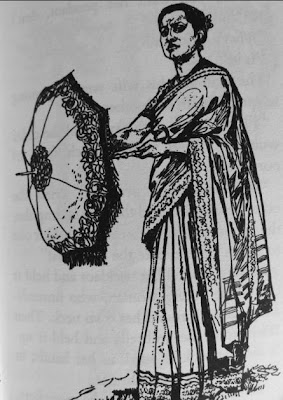It is a sweet rush to the senses when a book revisited after years still has the lure to momentarily bring back the magic of childhood. The Blue Umbrella, first published in 1974 is one such work. A book for children that can be read in a couple of hours, this Ruskin Bond gem is adorned with extraordinary black and white illustrations by Trevor Stubley and an eye-friendly font size.
The story is singular, of quite charm and simple pleasures, set in the hills of Garhwal. Ten year-old Binya lives with her widowed mother and elder brother Bijju, tending to the cows Neelu and Gori and helping the family in cultivating various food items on their own terraced fields. The produce is not ample to sell, but enough to subsist on. One day Binya happens to chance upon a group of picnickers from the plains and among their throng she notices a blue silk umbrella and falls in love with it. A woman's attraction to Binya's leopard-claw necklace leads to a dream exchange and lo, Binya now owns the beautiful umbrella! Meanwhile, 'the richest man in the area', the old tea shop owner Ram Bharosa covets the umbrella as its fame grows on the quiet hill side.
Beneath its straight-forward exterior, The Blue Umbrella has its insightful moments. Here's an excerpt:
Binya belonged to the mountains, to this part of the Himalayas known as Garhwal. Dark forests and lonely hilltops held no terrors for her. It was only when she was in the market-town jostled by the crowds in the bazaar, that she felt rather nervous and lost.
Seen through a child's eyes, the umbrella is an ode to beauty and utility. For an adult it is greed, materialism and a blindness to possess. Yet the two generations meet in harmony at the end of the book in an agreeable manner, and like the best children's stories, a glow of happily ever after pervades long after.
(Article by Snehith Kumbla)











